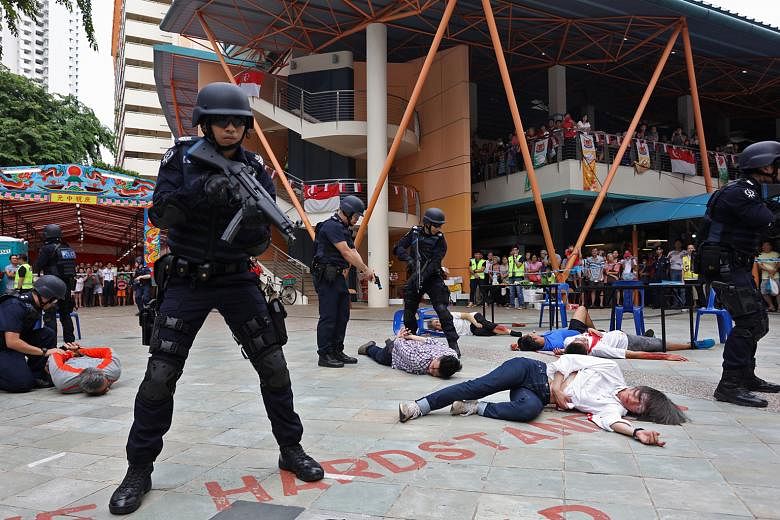Singapore's big push to get its people ready to respond to a crisis is making its way to workplaces.
Since its launch last year, the SGSecure movement has hit the heartland, where outreach efforts are under way to teach residents how to respond in the event of an attack.
This year, it will extend its reach to workplaces, Home Affairs and Law Minister K. Shanmugam said yesterday, urging companies to get involved.
He was giving more details on how SGSecure is set to grow this year. Mr Patrick Tay (West Coast GRC), Dr Tan Wu Meng (Jurong GRC) and Ms Rahayu Mahzam (Jurong GRC) had sought updates on the initiative during the debate on the Home Affairs Ministry's budget.
The SGSecure programme will train public officers and work with the Manpower Ministry, the National Trades Union Congress and the Singapore Business Federation to engage businesses and unions.
-
$5.78 billion
Total bill: Up 12.9 per cent
9
Singaporeans had security action taken against them for terrorism last year
11,000
police cameras will be installed islandwide over the next few years
24,000
residents to be trained in cardiopulmonary resuscitation, automated external defibrillator use in the coming years
There will be SGSecure briefings and conferences, customised Emergency Preparedness Days and counter-terrorism seminars for industries, such as the security, manufacturing and hospitality sectors.
Efforts to strengthen community cohesion and resilience are set to continue, Mr Shanmugam said in a speech that sketched out the tense security backdrop in the region, and detailed how the threat posed by the Islamic State in Iraq and Syria terror group has hit closer to home.
"We need to make sure our community comes together as one united people after an attack," he said.
Ms Rahayu also wanted to know how Singapore can better train its community leaders to respond in the wake of an attack.
Mr Shanmugam said a Crisis Response Exercise, which brings community stakeholders together in a simulated attack scenario, is being piloted within the constituencies.
Home Team psychologists will partner with the People's Association, and with psychologists from the Ministry of Social and Family Development and the Institute of Mental Health, to support and train grassroots leaders in giving psychological first aid to affected residents.
Senior Minister of State for Home Affairs Desmond Lee said the Home Team is also stepping up efforts to strengthen its partnerships with the community.
Mr Murali Pillai (Bukit Batok) has praised the Home Team for its hard work in keeping Singapore safe and secure, in a world grappling with rising threats to peace and security.
"We cannot afford to be complacent. The heavy responsibility of protecting Singapore does not and should not rest on the ministry and the Home Team alone," he said.
"We must recognise that this is a collective responsibility, which requires the combined effort of all of us who call Singapore our home."
Mr Lee agreed, saying: "An active citizenry that is invested in the safety and security of Singapore is essential to the Home Team's work."
He cited the Singapore Civil Defence Force's (SCDF's) Save-a-Life initiative, which aims to build a network of trained community responders to help those who suffer a cardiac arrest, as an example.
About 2,000 residents have been trained, and the programme hopes to train more than 24,000 residents in the coming years, he said.
More automated external defibrillators (AEDs) will be installed. By 2019, there will be 5,000 AEDs across Singapore - one for every two HDB blocks in all constituencies - up from close to 460 installed in eight constituencies currently.
Mr Lee encouraged more people to learn AED and cardiopulmonary resuscitation skills, and download the SCDF's myResponder app.
It alerts users to a report of somebody with cardiac arrest nearby, enabling them to respond quickly.


